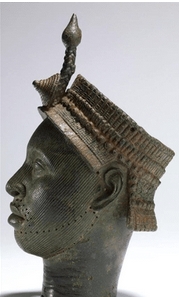
support@yorubalibrary.com
+2348073529208, 07038599574

Yoruba culture, with its deep-rooted traditions and rich heritage, has significantly influenced modern Nigeria. The Yoruba people, one of the largest ethnic groups in Nigeria, have contributed to various aspects of Nigerian life, including politics, education, religion, and the arts. This article explores the impact of Yoruba culture on contemporary Nigeria.
1) Traditional Leadership
Yoruba traditional leadership structures, such as the roles of Obas (kings) and chiefs, have shaped modern Nigerian governance. These traditional leaders continue to play crucial roles in local administration and conflict resolution. Their influence extends into national politics, where they often serve as mediators and advisors, maintaining stability and continuity of cultural values.
2) Democracy and Activism
Yoruba leaders have been instrumental in Nigeria's journey towards democracy. Notable figures like Obafemi Awolowo, a key leader in Nigeria's independence movement, championed democratic principles and education. Yoruba political activism has fostered a strong sense of civic responsibility and participation among Nigerians.
3) Establishment of Institutions
The Yoruba have a long history of valuing education, which has led to the establishment of numerous educational institutions. The University of Ibadan, Nigeria's premier university, and Obafemi Awolowo University are products of Yoruba commitment to higher learning. These institutions have produced many of Nigeria's intellectuals and professionals.
4) Promotion of Literacy
Yoruba culture emphasizes literacy and learning, contributing to higher literacy rates in southwestern Nigeria. The early adoption of Western education by the Yoruba has had a lasting impact, with many Yoruba people excelling in various academic and professional fields.
5) Syncretism and Diversity
Yoruba religious practices, characterized by their syncretism, have influenced Nigeria's religious landscape. The blend of traditional Yoruba beliefs with Christianity and Islam has created unique religious expressions and practices. For instance, the Aladura churches incorporate Yoruba spiritual concepts into Christian worship, attracting a large following.
6) Orisha Worship and Global Impact
The worship of Orishas, or Yoruba deities, has not only influenced local religious practices but has also spread globally through the African diaspora. This has enhanced Nigeria's cultural export and enriched global understanding of Yoruba spirituality.
7) Literature and Film
Yoruba culture has significantly influenced Nigerian literature and film. Prominent writers like Wole Soyinka, the first African Nobel laureate in Literature, draw heavily from Yoruba traditions and folklore. Nollywood, Nigeria's booming film industry, often features Yoruba stories and themes, showcasing the culture to a global audience.
8) Music and Dance
Yoruba music and dance have made substantial contributions to Nigeria's cultural identity. Genres like Juju and Fuji music have roots in Yoruba rhythms and instruments. Contemporary Nigerian musicians often incorporate Yoruba language and themes into their work, promoting cultural heritage.
9) Festivals and Celebrations
Yoruba festivals, such as the Osun-Osogbo Festival, attract tourists and boost Nigeria's cultural tourism. These festivals celebrate Yoruba heritage and contribute to national pride and cultural preservation.
10) Family and Community
Yoruba culture places a strong emphasis on family and community, values that resonate throughout Nigerian society. The extended family system and communal living practices promote social cohesion and mutual support, essential elements in Nigeria's social fabric.
11) Respect and Etiquette
Respect for elders and authority is a fundamental Yoruba value that has influenced social interactions in Nigeria. This cultural norm ensures harmonious relationships and continuity of traditions, reinforcing societal stability.
Conclusion
The impact of Yoruba culture on modern Nigeria is profound and multifaceted. From politics and education to religion and the arts, Yoruba traditions and values have shaped the nation's identity and development. Understanding this influence highlights the importance of preserving and promoting Yoruba culture as a vital part of Nigeria's heritage.

Learn about the Yoruba concept of Ìwà Pẹ̀lẹ́ (good…

Learn special praises for Divine Being and Creator…